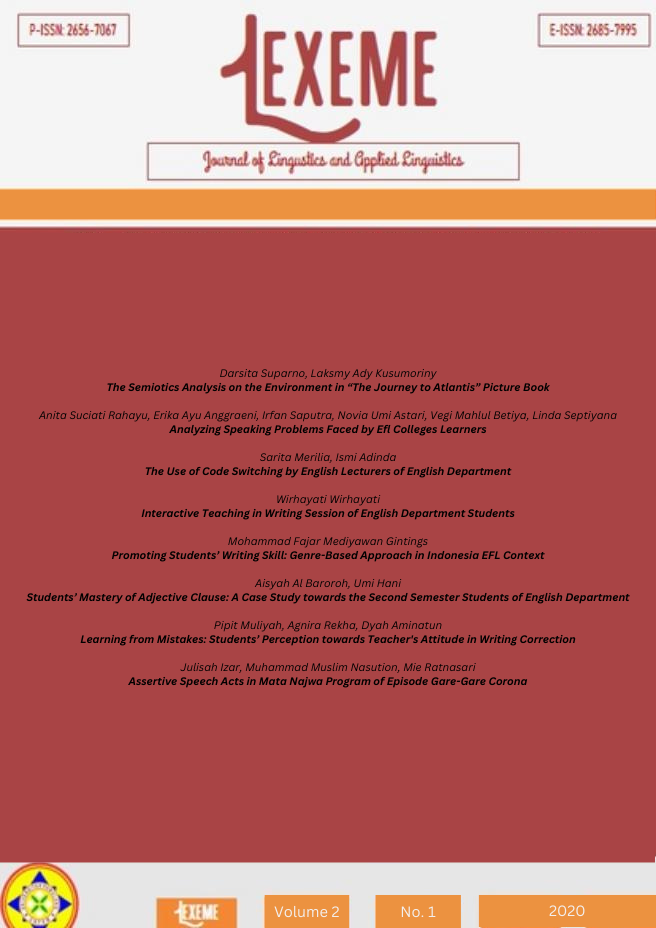Learning from Mistakes: Students’ Perception towards Teacher's Attitude in Writing Correction
DOI:
https://doi.org/10.32493/ljlal.v2i1.6995Keywords:
students’ perception, teachers’ attitude, writing correction.Abstract
Most of writing teachers agree that writing skill is the most difficult subject for foreign language learners. The difficulties come from complexity of planning, idea organization, revision, and the use of lexical and grammatical. Correcting or giving feedback to students’ writing is also difficult for teachers, since it takes time and energy. Thus, this study tried to explore students’ perception towards teachers’ attitude in writing correction by distributing questionnaire to 20 students and 4 writing teachers, observing the teaching activities, and documenting students’ work. The study showed the result that teachers and students responses revealed various discrepancies between teachers and students’ perception for error and mistake correction. Then, most of students indicated that they do not understand the teachers’ feedback towards their writing composition. Therefore, it is recommended that teachers incorporate classroom discussions on error correction, feedback, and writing in order to help their students understand how feedback is intended to affect their writing and why it is given in particular way.References
Ashwell, T. (2000). Patterns of teacher response to student writing in a multiple draft composition classroom: Is content feed- back followed by form feedback the best method? Journal of Second Language Writing. 9(3): 227-257. Dixon, N. (2005). Why put writing last? - Integrating the Productive Skills in General English Classes. Paper presented in LIA International Conference 2005, Jakarta, March 22-24. Ferris, D., & Roberts, B. (2001). Error feedback in L2 writing classes: How explicit does it need to be? Journal of Second Language Writing, 10(3), 161-184. Ferris, D.R. (2003). Response To Students Writing: Implications For Second Language. Fredrickson. (2013). Advances in Experimental Social Psychology. Burlington: Academic Press.
Furnborough, C., & Truman, M. (2009). Adult beginner distance language learner perceptions and use of assignment feedback, Distance Education, 30, 399-418 Ghaith, G. (2002). Writing. Online from http://712educators about.Com/cs/writingessays/a/paragraphs.htm. access on November, 01 2015 in 11.30 a.m. Grenville, K. (2001). Writing from Start to Finish: A Six-Step Guide. Sidney: Griffin Press. Hamouda, A. (2011). A Study of students and teachers’ preferences and attitudes towards correction of classroom written errors in Saudi EFL Context. English Language Teaching. 4(3) 130-141. Doi: 10.5539/Elt.Vn4p128 Harmer, J. (2004). How to Teach Writing. Kuala Lumpur: Pearson Education Limited. Hyland, K. 2006. Feedback in Second Language Writing. New York: Cambridge John, B., Staurt, Y., & Denise (2005). The effect of different types of corrective feedback on esl student writing. Journal of Second Language Writing,14(2005), 191-205. Kurniali, S. (2008). Tip-Trik Pilihan Blogger. Jakarta. PT Elex Media Computindo. Lewis M. (2002). Giving Feedback in Language Classes. The University of Auckland: SEAMO Regional Language Centre Lumetta, H., & Jennie. 2005. Feedback for Learners: Effective Techniques and Strategies. Illinois: University of Illinois. Nunan, D. (2003). Practical English Language Teaching. Boston: Mc Graw Hill Pickens, Jeffrey. (2005). Perceptions and Attitudes of Individuals. New York: Jones and Barlet Publishing Riyani, T. (2009). Improving the Students’ Writing Skill through Feedback. Unpublished S-1 Thesis: Universitas Negeri Sebelas Maret. Singh, M. & Singh. 2002. Art of Effective English Writing. India: Chand and Company Ltd. Valero, Amando Lopez., Fernadez,Eduardo, Encabo., Iseni, Arburirm. 2008. Teachers’ Attitudes Towards Coreecting Students Written Errors And Mistakes. Porta Linguarium 2(1), 21-30. doi: 1697.7467.913. Wang, P. (2010). Dealing with English major’s written errors Chinese Universities. Journal of Language Teaching And Research. 1(3), 194-205. Doi: 11.5549/Elt.Y5n3p174







